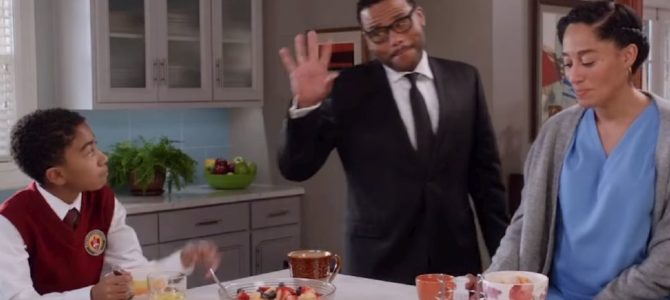
ABC’s “Black-ish” returned for its fourth season on a new night, and debuted an episode that will undoubtedly become one of the most memorable TV premieres this fall. Call it a coincidence, perfect storm, whatever. Creator Kenya Barris riffed on the holiday Columbus Day to highlight a larger question to viewers about who should be credited for building the United States of America. Spoiler alert: it was the slaves.
Similar to most feel-good sitcoms, the episode begins at the elementary school of the twins Jack and Diane, this year the stars of the annual Columbus Day play. To avoid “an incident,” the school busses in minority students to serve as supporting characters. Throughout the course of the play, Dre (Anthony Anderson) envisions how he would tell the story of Columbus. By his standards, Christopher Columbus is the antithesis of an American hero. He’s an evil man who robbed established citizens of their land through imperialism.
It’s Always Time to Get Woke
If you’re a fan of the show like me, you probably know how the rest of the episode goes. In the scene that follows, Dre releases his angst on his co-workers at Stevens and Lido, an advertising firm where he is the quintessential “woke” employee. Instead of honoring Columbus, Dre prefers to celebrate Juneteenth, the summer holiday commemorating the release of slaves post-Reconstruction.
When his white colleagues all show similar confused expressions, Dre decides this is the perfect time to explain what Juneteenth means. Back in 1865, on June 19 Union soldiers arrived to Galveston, Texas with great news: the Civil War had just ended and all slaves were officially free. Keep in mind; this news came more than two years after Abraham Lincoln’s Emancipation Proclamation, which was ratified on January 1, 1863.
With the help of singer Aloe Blacc and The Roots, Dre spoofs your favorite childhood educational cartoon “School House Rock” song “I’m Just a Bill,” rewording it as, “I’m Just a Slave.” The twist is a pithy explanation of the African slave trade leading up to when slavery officially ended in the United States.
Throughout its run, “Black-ish” has capitalized on real-life controversial topics that have troubled our nation by portraying them with fictional storylines. Grandmother and resident critic of all things Ruby (Jenifer Lewis) perfectly describes the complication of selling Juneteenth as a national holiday: “People don’t want to celebrate something we barely want to admit happened.” She’s right. Slavery has long been an uncomfortable topic, so commemorating the demise of the buying, selling, and trading of human beings is pretty awkward.
Teachability Clashes with Agenda-Pushing
Any show that educates while providing a comedic element gets at least a one-episode watch from me. “Black-ish” does a great job of representing a middle-class, affluent minority family and their everyday crusade to remain true to their roots. Loyal viewers know what they’re going to get.
For unaware viewers who are looking to delve into a new show, starting with this episode of “Black-ish” won’t lead them to continue with episode two. You see, just as much as Juneteenth is important to recognize, so is Christopher Columbus. Promoting an iconic celebration in black history while condemning a significant figure in American history contradicts the teachable moment aim of the episode, even though recently it has been fun and trendy to hate Columbus.
People have long regarded television as an aim to escape reality and immerse themselves into the funny, fictional dilemmas of someone else’s life. I commonly find myself happy I can escape my own problems and for 22 minutes focus on the disastrous, yet relatable crisis that is Mindy Lahiri’s love life.
Without any previous understanding of the widely popular musical “Hamilton” the episode pays homage to, most viewers might find the episode flat, lacking that sharp and witty delivery “Black-ish” is praised for. Case in point, the other two musical numbers weren’t as engaging as “I’m Just a Slave,” and maybe that’s where I was left feeling confused with the episode’s overall approach to its subject matter.
Dre’s relationships with his co-workers (Deon Cole, Wanda Sykes, Jeff Meacham, Nelson Franklin, Peter Mackenzie) are part of what makes the show hilariously entertaining. I would have appreciated more of a “come to Jesus” moment where they acknowledge the need to celebrate a lesser-known holiday, rather than another musical number used a plot filler.
“Black-ish” unapologetically pushes viewers out of their comfort zone. While presenting a variety of harsh opinions meant to highlight a larger issue, the show often confuses the desired takeaway with preachy undertones. As the season continues, I’m certain it will tackle issues deeper than Juneteenth. Rather than imposing those ideas on the audience, they’re better off illustrating the plot with an invitation for the viewer to develop his or her individual conclusion.









